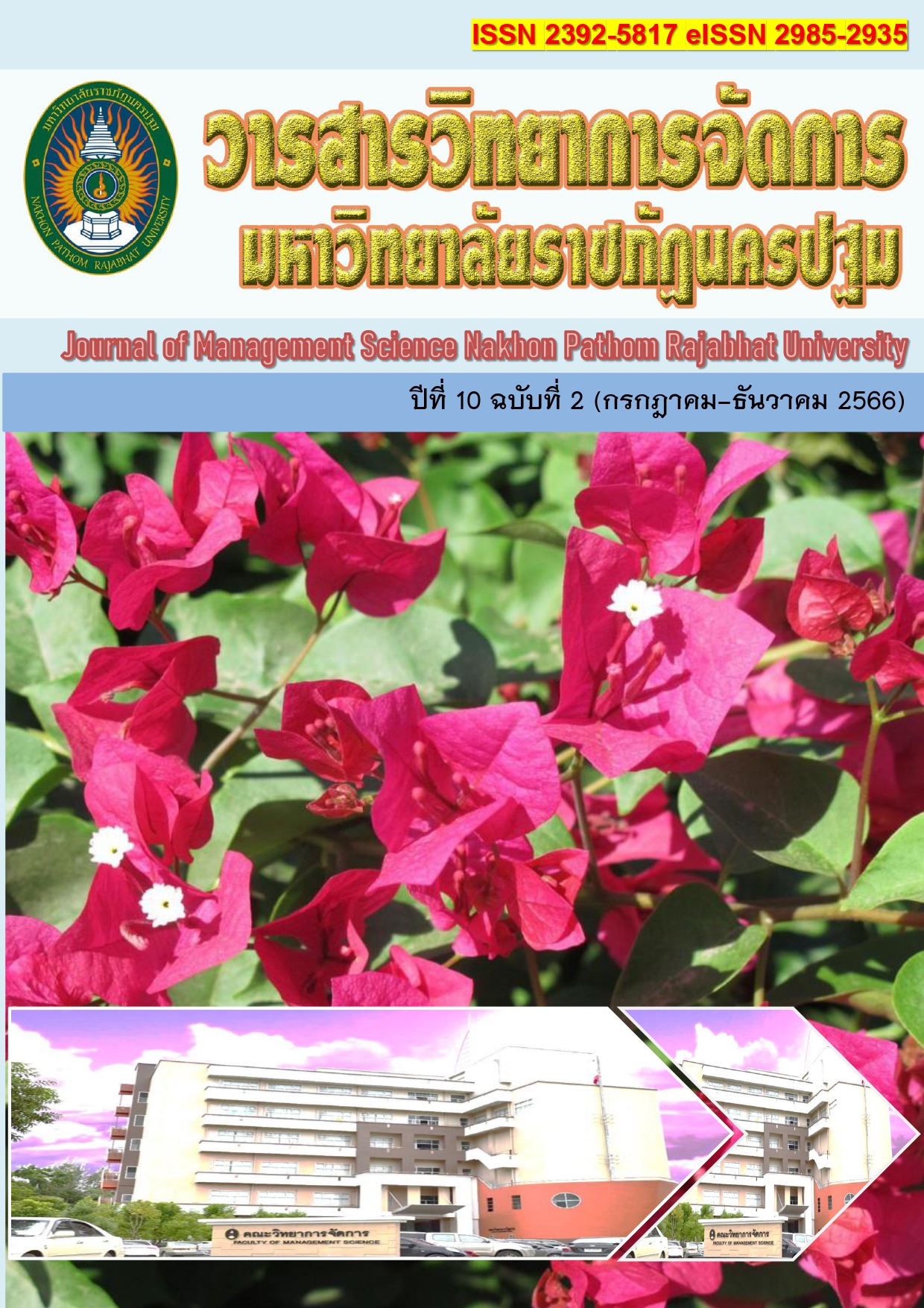The Influence of Sensory Marketing on Brand-name Coffee Consumption Behavior
Main Article Content
Abstract
The results were as follows; marketing factors through the five senses of brand-name coffee shops. Five senses affect the distinctiveness of the coffee shop, affecting consumption behavior sense of smell and sound affects the arousal and the taste sensation affects the happiness of the consumer. Including the five sensory factors also affect the motivation for consuming brand-name coffee.
Article history: Received 15 March 2023
Revised 14 August 2023
Accepted 18 August 2023
SIMILARITY INDEX = 0.44 %
Article Details

This work is licensed under a Creative Commons Attribution-NonCommercial-NoDerivatives 4.0 International License.
The views and opinions of the article appearing in this journal are those of the author. It is not considered a view and responsibility of the editorial staff.
References
สมชนก เตชะเสน. (2563). กาแฟไทย อนาคตที่ไปได้อีกไกล. [ออนไลน์]. ค้นเมื่อ 5 กุมภาพันธ์ 2566 จาก https://exac.exim.go.th/detail/20200323125039/20200701142818
สรารัตน์ คําใส เยาวภา ปฐมศิริกุล และ มณฑิกานต์ เอี่ยมโซ้. (2566). พฤติกรรม ผู้ บริโภค และ ส่วน ประสม การ ตลาด บริการ ที่ มี ความ สัมพันธ์ กับ ความ ภักดี ของ ลูกค้า ธุรกิจ กาแฟ. Journal of Management and Local Innovation, 5(5), 51-62.
สุนิษฐา เศรษฐีธร. (2562). ศูนย์อัจฉริยะเพื่ออุตสาหกรรมอาหารสถาบันอาหาร. [ออนไลน์]. ค้นเมื่อ 25 กันยายน 2564 จาก http://fic.nfi.or.th/upload/market_overview/Rep_Cafe_15.01.62.pdf
Alpert, M. I., Alpert, J. I., and Maltz, E. N. (2005). Purchase occasion influence on the role of music in advertising. Journal of business research, 58(3), 369-376.
Bigné, J. E., Andreu, L., and Gnoth, J. (2005). The theme park experience: An analysis of pleasure, arousal and satisfaction. Tourism management, 26(6), 833-844.
Bollen, K. A. (1989). A New Incremental Fit Index for General Structural Equation Models. Sociological Methods and Research, 17(3), 303-316.
Chou, C. M. (2013). Factors affecting brand identification and loyalty in online community. American Journal of Industrial and Business Management, 3(08), 674.
Comrey, A. L., and Lee, H. B. (1992). Interpretation and application of factor analytic results. New York: Psychology press.
Csikszentmihalyi, M. (1997). Flow and the psychology of discovery and invention. Harper Perennial, 39: 1-16.
Ebrahim, R., Ghoneim, A., Irani, Z., and Fan, Y. (2016). A brand preference and repurchase intention model: the role of consumer experience. Journal of Marketing Management, 32(13-14), 1230-1259.
Hamdan, H., and Paijan, P. (2020). Utilitarian values and hedonic values of women coffee lovers. Dinasti International Journal of Education Management and Social Science, 2(2), 310-322.
Henseler, J., Ringle, C. M., and Sinkovics, R. R. (2009). The use of partial least squares path modeling in international marketing. In New challenges to international marketing. Emerald Group Publishing Limited, 20, 277-319.
Jang, H. W., and Lee, S. B. (2019). Applying effective sensory marketing to sustainable coffee shop business management. Sustainability, 11(22), 6430.
Jianying, F., Xia, W., Zetian, F., and Weisong, M. (2014). Assessment of consumers' perception and cognition toward table grape consumption in China. British Food Journal, 116(4), 611-628.
Kim, C. H., and Jung, Y. S. (2018). A Study on the Effects of Experiential Marketing on Satisfaction, Loyalty and Purchase Intention. Korean J. Bus. Adm, 31, 603-624.
Kim, S. H., Kim, M., and Holland, S. (2018). How customer personality traits influence brand loyalty in the coffee shop industry: The moderating role of business types. International journal of hospitality and tourism administration, 19(3), 311-335.
Krishna, A. (2012). An integrative review of sensory marketing: Engaging the senses to affect perception, judgment and behavior. Journal of consumer psychology, 22(3), 332-351.
Kuczamer-Kłopotowska, S. (2017). Sensory marketing as a new tool of supporting the marketing communication process in tourism services sector. Handel, 367(2), 226-235.
Mehrabian, A., and Russell, J. A. (1974). An approach to environmental psychology. the MIT Press.
Munnukka, J., and Järvi, P. (2012). The price‐category effect and the formation of customer value of high‐tech products. Journal of Consumer Marketing, 29(4), 293-301.
Peck, J., and Childers, T. L. (2008). Sensory factors and consumer behavior. Handbook of consumer psychology, 4, 193-219.
Rahmah, K., Sumarwan, U., and Najib, M. (2018). The Effect Of Brand Equity, Marketing Mix, And Lifestyle To Purchase Decision At Maxx Coffee, Bogor. Journal of Consumer Sciences, 3(2), 1-15.
Rashid, A. A., Hamidizade, A., Esfidani, M. R., and Matin, H. Z. (2016). The effect of cause-related marketing on the consumer purchase intention: focusing on the meditating variables (studied on clients of Ghalamchi educational services).
Rodrigues, C., Hultén, B., and Brito, C. (2011). Sensorial strategies for value co-creation. Innovative Marketing, 7(2), 47-54.
Schmitt, B. (1999). Experiential marketing. Journal of marketing management, 15(1-3), 53-67.
Schollenberg, L. (2012). Estimating the hedonic price for Fair Trade coffee in Sweden. British Food Journal. 114(3), 428-446.
Sihvonen, J., and Turunen, L. L. M. (2022). Multisensory experiences at travel fairs: What evokes feelings of pleasure, arousal and dominance among visitors?. Journal of convention and event tourism.23(1): 63-85). Routledge
Sirgy, M. J., Kruger, P. S., Lee, D. J., and Yu, G. B. (2011). How does a travel trip affect tourists’ life satisfaction? Journal of Travel research, 50(3), 261-275.
Tu, Y. T., and Chang, H. C. (2012). Corporate brand image and customer satisfaction on loyalty: An empirical study of Starbucks coffee in Taiwan. Journal of Social and Development Sciences, 3(1), 24-32.
Wang, E. S. T., and Yu, J. R. (2016). Effect of product attribute beliefs of ready-to-drink coffee beverages on consumer-perceived value and repurchase intention. British Food Journal. 118(12), 2963-2980.


